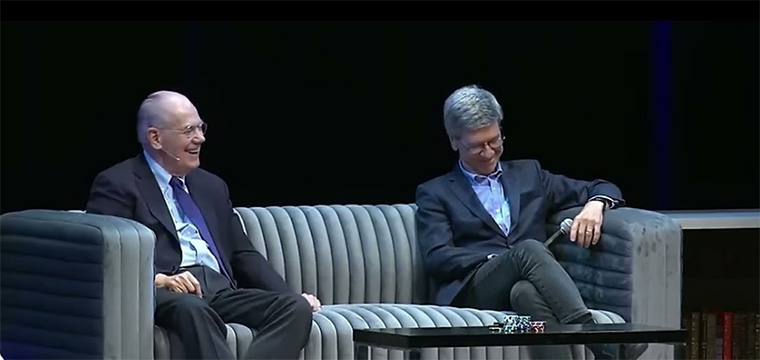
At the “All-In Summit,” two of the most provocative voices in foreign policy, University of Chicago’s John Mearsheimer and Columbia University’s Jeffrey Sachs, joined the hosts of the “All-In” podcast for a wide-ranging discussion that peeled back the layers of global power dynamics. The conversation took an unflinching look at the role of the so-called “Deep State,” exposing the ways in which both major political parties, despite outward appearances, are complicit in the projection of U.S. power across the globe. From the U.S.’s involvement in Ukraine to the long-term implications of China’s rise, these intellectual titans didn’t just explain the mechanics of American hegemony — they questioned its sustainability in an age where nuclear war looms on the horizon.
The key question left hanging in the air was whether America, and the World, can break free from this self-destructive cycle, or whether we are all inevitably trapped in what Mearsheimer has famously called the “tragedy of great power politics.”
 John Mearsheimer (left) and Jeffrey Sachs.
John Mearsheimer (left) and Jeffrey Sachs.
You can watch the entire discussion on video, and here are the key excerpts from this great conversation, published on September 16, 2024 at YouTube.
SACHS: …There’s basically one Deep State party, and that is the party of Cheney, Harris, Biden, Victoria Nuland — my colleague at Columbia University now — and Nuland is kind of the face of all of this because she has been in every administration for the last 30 years. She was in the Clinton administration, wrecking our policies towards Russia in the 1990s. She was in the Bush administration with Cheney, wrecking our policies towards NATO enlargement. Then she was in the Obama administration as Hillary’s spokesperson first, and then making a coup in Ukraine in February 2014. Not a great move — started a war. Then she was Biden’s under Secretary of State. Now, that’s both parties. It’s a colossal mess.
MEARSHEIMER: When we talk about the Deep State, we’re talking about the administrative state. It’s very important to understand that starting in the late 19th and early 20th centuries, given developments in the American economy, it was imperative that we develop — and this was true of all Western countries — a very powerful central state that could run the country. Over time, that state has grown in power, and since World War II, the United States, as you all know, has been involved in every nook and cranny of the world, fighting wars here, there, and everywhere. To do that, you need a very powerful administrative state that can help manage foreign policy. But in the process, what happens is you get all of these high-level bureaucrats, mid-level, and low-level bureaucrats who become established in positions in the Pentagon, the State Department, the intelligence community, you name it, and they end up having a vested interest in pursuing a particular foreign policy. The particular foreign policy that they like to pursue is the one that the Democrats and the Republicans are pushing.
SACHS: there’s a deeply entrenched foreign policy that’s been in place for decades. In my interpretation, it’s been in place mostly for 30 years, but arguably a variant of it has been in place since 1992. I got to watch some of it early on because I was an adviser to Gorbachev and to Yeltsin, and I saw the early makings of this, though I didn’t fully understand it except in retrospect. But that policy has been mostly in place pretty consistently for 30 years, and it didn’t really matter whether it was Bush Senior, Clinton, Bush Jr., Obama, or Trump.
To interpret American foreign policy, it’s to maximize power I think it’s a very good description of American foreign policy, which is that it’s trying to maximize global power, essentially to be a global hegemon. Every decision that I’ve seen in the last 30 years always leans in the same direction, which is power as the central objective.
MEARSHEIMER: It’s also very important to understand that the United States is a fundamentally liberal country, and we believe that we have a right, a responsibility, and the power to run around the world and remake the world in America’s image. Most people in the foreign policy establishment — Republicans and Democrats — they believe that, and that is what has motivated our foreign policy in large part since the Cold War ended. Remember, when the Cold War ended, we had no rival great power left. So what are we going to do with all this power that we have? What we decided to do was go out and remake the world in our own image.
SACHS: In my work, 40 years overseas, I don’t think the U.S. government gives a damn about these other places. I don’t think they really care if it’s a liberal democracy or a dictatorship — they want the right of ways, they want the military bases, they want the state to be in support of the United States, they want NATO enlargement. I don’t know if you’ve written it, but there are some who believe in state-building. God, if they do, they are so incompetent it’s unbelievable...
Almost all the time that we intervene, it’s because we view this as a power situation for the U.S. So whether it’s Ukraine, Syria, or Libya, even if we define it as defending something, believe me, it’s not about defending — it’s about a perception of U.S. power and U.S. interests and objectives of U.S. global hegemony. If we analyze the Ukraine conflict just a little below the surface, this is not about Putin invading Ukraine. This is something a lot different that has to do with American power projection into the former Soviet Union.
We used the cynical bullshit that we’re “defending the people of Benghazi” to bomb the hell out of Libya, to kill Moammar Gaddafi. Why did we do that? Well, I’m kind of an expert on that region, and I can tell you, maybe because Sarkozy didn’t like Gaddafi. There’s no much deeper reason except Hillary liked every bombing she could get her hands on, and Obama was kind of convinced: “My Secretary of State says go with it, so why don’t we go with the NATO expedition?”
It had nothing to do with Libya. It unleashed 15 years of chaos. We cheated the UN Security Council because, like everything else we’ve done, it was based on false pretenses. We did the same with trying to overthrow Syria. We did the same with conspiring to overthrow Victor Yanukovych in Ukraine in February 2014. The problem with this argument is that we’re not nice guys. We’re not trying to save the world; we’re not trying to make democracies. We had a committee — by the way, full of all the luminaries you could mention, but they’re the neocon crazies — the Committee for the People of Chechnya. Are you kidding? Do you think they even knew where Chechnya is or cared about Chechnya? But it was an opportunity to get at Russia, to weaken Russia, to support a jihadist movement inside Russia. It’s a game of power.
MEARSHEIMER: I’m not interested in regime change. I’m not interested in trying to turn China into a democracy — not going to happen. It’s foolish to even pursue a policy of engagement toward China. With regard to Russia, I don’t think Russia is a serious threat to the United States. Indeed, I think the United States should have good relations with Putin. It’s a remarkably foolish policy to push him into the arms of the Chinese. There are three great powers in the system: the United States, China, and Russia. China is a peer competitor to the United States. It’s the most serious threat to the United States. If you are playing balance of power politics and you’re interested, as the United States, in containing China, you want Russia on your side of the ledger. But what we’ve done, in effect, is push Russia into the arms of the Chinese. This is a remarkably foolish policy. Furthermore, by getting bogged down in Ukraine, and now bogged down in the Middle East, it’s become very difficult for us to pivot to Asia to deal with China, which is the principal threat that we face.
What China has begun to do, as it’s gotten increasingly powerful economically, is translate that economic might into military might. It is trying to dominate Asia. It wants to push us out beyond the first island chain, beyond the second island chain. It wants to be like we are in the Western Hemisphere.
I don’t blame the Chinese one bit. If I were the National Security Advisor in Beijing, that’s what I’d be telling Xi Jinping we should be trying to do. But, of course, from an American point of view, this is unacceptable. We do not tolerate peer competitors. We do not want another regional hegemon on the planet.
In the 20th century, there were four countries that threatened to become regional hegemons like us: Imperial Germany, Imperial Japan, Nazi Germany, and the Soviet Union. The United States played a key role in putting all four of those countries on the scrap heap of history. We want to remain the only regional hegemon in the world. We are a ruthless great power—never want to lose sight of that fact.
SACKS: I deeply believe the only threat to the United States, period, in the world, given the oceans, given our size, and given our military, is nuclear war. I deeply believe we’re close to nuclear war because we have a mindset that leads us in that direction. We have a mindset that everything is a challenge for survival, and that escalation is therefore always the right approach. My view is, a little bit of prudence could save the whole planet. Why I don’t like Ukraine is that I don’t see any reason in the world that NATO has to be on Russia’s border with Ukraine...
We are now in a direct war with Russia. Not a proxy war — a direct war. Russia has 6,000 nuclear warheads. I can’t think of anything more imbecilic than that, aside from the fact that I’ve seen, step by step, how we got into this mess. We thought we had to meddle up to the point of including NATO in Georgia, the Caucasus, and Ukraine. We couldn’t let things be — we had to meddle because we couldn’t let well enough alone. If we do the same with China, there will be a war. But it’s not going to be like reading about the Crimean War, World War I, or World War II — this is a different age.
MEARSHEIMER: We are in what I like to call an “iron cage.” This is just the way international politics works, and it’s because you’re in an anarchic system where you can never be sure that a really powerful state won’t come after you and inflict a century of national humiliation on you. So, you go to great lengths to avoid that by trying to gain power at the expense of another power. That leads to all sorts of trouble.
Can war be avoided? I like to distinguish between security competition — which I think is inevitable — and war, where security competition evolves into war. I think war can be avoided, and we were thankfully successful in that regard during the Cold War. Hopefully, that will be the case in the U.S.-China competition moving forward. Can I guarantee that? No. Does this disturb me greatly? Yes. But again, this is just a tragic aspect of the world.
read more in our Telegram-channel https://t.me/The_International_Affairs

 9:56 04.11.2024 •
9:56 04.11.2024 •






















